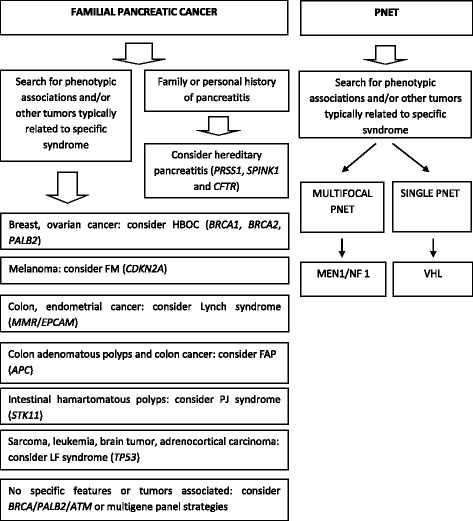Hereditary pancreatic cancer: related syndromes and clinical perspective
- PMID: 28670351
- PMCID: PMC5490219
- DOI: 10.1186/s13053-017-0069-6
Hereditary pancreatic cancer: related syndromes and clinical perspective
Abstract
Pancreatic cancer is a very aggressive disease with a poor prognosis. The majority of them are attributed to sporadic causes, especially to many modifiable risk factors such as tobacco or alcohol abuse. The principal histologic subtype of pancreatic cancer is ductal adenocarcinoma. Pancreatic neuroendocrine tumors, which constitute a more indolent entity, represent second type of pancreatic cancer in terms of incidence. Individuals with a family history of pancreatic cancer carry an increased risk of developing the disease, which may be related to an underlying hereditary component. Unfortunately, in the majority of these families the suspected germline genetic cause responsible of the disease will not be identified, but approximately in a 20% of the cases a hereditary cancer predisposition syndrome with increased risk of pancreatic cancer development can be recognized. This review will be focused on the leading hereditary cancer syndromes related to pancreatic ductal adenocarcinoma and pancreatic neuroendocrine tumors. Additionally, we will try to explain clinical aspects related to the identification of germline mutations in pancreatic cancer patients and their potential implications in oncologic treatment decisions.
Keywords: Familial pancreatic cancer; Genetic testing; Hereditary cancer; Pancreatic ductal adenocarcinoma; Pancreatic neuroendocrine tumor.
Conflict of interest statement
Ethics approval and consent to participate
Not applicable.
Consent for publication
Not applicable.
Competing interests
The authors declare that they have no competing interest.
Publisher’s Note
Springer Nature remains neutral with regard to jurisdictional claims in published maps and institutional affiliations.
Figures
References
-
- Gold EB, Goldin SB. Epidemiology of and risk factors for pancreatic cancer. Surg Oncol Clin N Am. 1998;7:67–91. - PubMed
-
- Malvezzi M, Carioli G, Bertuccio P, Boffetta P, Levi F, La Vecchia C et al. European cancer mortality predictions for the year 2017, with focus on lung cancer. Ann Oncol 2017 mdx033. doi:10.1093/annonc/mdx033. - PubMed
-
- Pancreatic Cancer: statistics. Available from: http://www.cancer.net/cancer-types/pancreatic-cancer/statistics. Accessed 20 Feb 2017.
Publication types
LinkOut - more resources
Full Text Sources
Other Literature Sources



